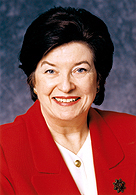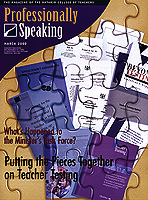
By Margaret Wilson
In the last issue of Professionally Speaking, I wrote about the College’s
commitment to ensuring the quality of Additional Qualification courses and asked our
members to let us know about their experiences.
Since then, I have received a number of letters about the Additional Qualification
courses our members have taken. In every case, teachers have both good and bad things to
say.
Some of the courses are disappointing in that they offer little that is challenging;
sometimes the content does not reflect the course’s name. One writer, critical of a
course on Special Education, suggested that the content of courses should be much more
clearly stated to ensure that they will meet expectations. However, the same writer
mentioned other courses on the same topic that were excellent, well presented and taught
by very knowledgeable instructors.
Another College member wrote of a number of courses she had taken in mathematics,
religion and music. Some of the best of them did not offer Additional Qualification
credit, she says, and recommends that the College look at expanding the list of Additional
Qualification courses.
It is very gratifying to get this kind of feedback from College members, and will prove
very useful as we continue to address the issue of high-quality Additional Qualification
courses. I am always impressed at how much professional learning teachers do, and I
welcome your input on this subject.
TEACHING OPPORTUNITIES ACROSS CANADA
The College has also been moving forward on the issue of mobility for teachers across
Canada. Last year, the ministers of education for all provinces and territories in Canada
discussed a new agreement that will enable a teacher who is qualified in one Canadian
province or territory to obtain certification in other parts of the country. The agreement
includes the possibility of conditional certification to protect the specific standards of
provincial jurisdictions.
The College Council will be reviewing the agreement for approval at its next meeting, a
step being taken by regulatory bodies in every other province and territory. The agreement
replaces one that expired in 1996 and covered only eight provinces. British Columbia,
Saskatchewan and the territories will now also be part of the new system.
While this agreement requires that teachers meet the certification requirements of
other provinces, it will greatly increase opportunities for teachers and will help school
boards to find the staff they need.
I am also happy to see that the College’s initiatives to call attention to the
chronic shortage of teachers in a number of subject areas is having an effect. The
Education Improvement Commission’s report on the new district school boards is recent
evidence of the growing awareness of teacher shortages.
JOINT EFFORTS TO END SHORTAGES
One of the Commission’s recommendations is that the College, the Ministry of
Education, the faculties of education and the district school boards work together to
develop and implement strategies to “ensure that Ontario’s schools are staffed
with appropriately qualified teachers.”
The College is wholeheartedly committed to working with the ministry and other
stakeholders to increase the supply of teachers in the coming years. In fact, the
education sector has already developed a number of very effective strategies to address
this issue. You can read about them in the story on page 16 about the Minister’s task
force. And while the College and other stakeholder organizations have worked together to
move forward on some of them, many others are in limbo, waiting for action by the
education ministry.
I hope that by the next time the subject of the task force is raised, I have a more
positive outcome to report.

